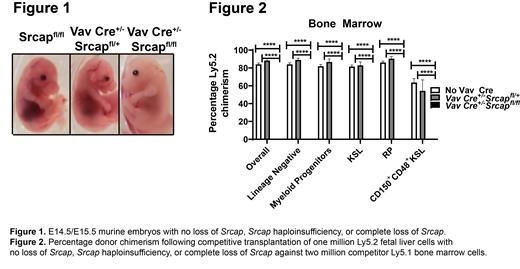The incorporation of variant histones into chromatin has been revealed to be an important mechanism of epigenetic regulation. Deposition of H2A.Z, in particular, is known to mediate several essential cellular processes including chromatin organization, DNA damage response, and transcriptional regulation. Nonsense and frameshift mutations in the H2A.Z exchanger, SRCAP, have been recurrently identified in both clonal hematopoiesis and AML, suggesting the importance of this gene in both non-malignant hematopoiesis and leukemogenesis. However, the precise role of SRCAP and the impact of its dysregulation on hematopoiesis remain unknown.
To investigate the role of Srcap in hematopoiesis, we generated a conditional Srcap loss of function murine model with loxP sites flanking exons 11-16. Cre-induced deletion of these exons results in a loss of the catalytic ATPase domain along with a frameshift within the remaining protein sequence. When Vav1-iCre +/-Srcap fl/+ and Srcap fl/fl mice are crossed, no Vav1-iCre +/-Srcap fl/fl pups are born, suggesting that hematopoietic-specific-loss of Srcap is embryonic lethal. At E14.5/15.5, Vav1-iCre +/-Srcap fl/fl embryos are paler than other genotypes ( Figure 1) with a reduced number of Ter119 + fetal liver cells. Interestingly, the decrease in Ter119 + cells upon Srcap loss occurs primarily in later stage erythroid progenitors, whereas the number of stage 1 erythroid progenitors is relatively well preserved, suggesting that loss of Srcap adversely impacts fetal erythroid maturation. Furthermore, Srcap loss impacts fetal liver myeloid maturation. While the number of granulocytes is unchanged in Srcap deficient embryos, they have a near complete absence of monocytes, monocyte-dendritic cell progenitors, and monocyte progenitors. In contrast to the changes observed within mature hematopoietic populations, phenotypic hematopoietic stem cells (HSCs) are maintained in Vav1-iCre +/-Srcap fl/fl fetal livers. However, their function is impaired as fetal liver HSCs fail to repopulate upon transplantation ( Figure 2). Importantly, adult HSCs isolated from Mx1-Cre +/-Srcap fl/flmice show a very similar phenotype in that they fail to maintain hematopoiesis when transplanted and treated with poly (I:C). In total, this data shows that Srcap is essential for the maintenance and proper function of both mature hematopoietic populations and hematopoietic progenitors with different lineages and developmental stages displaying varied sensitivities to Srcap loss.
To investigate the cellular consequences of SRCAP loss, we knocked down SRCAP expression in hematopoietic cell lines using an inducible shRNA approach. In agreement with the results obtained from our murine model, SRCAP deficient MOLM13 cells show a baseline competitive growth disadvantage that becomes apparent within one week of culture. This is associated with increased γ-H2AX activity, suggesting enhanced DNA damage and consistent with the previously identified role of SRCAP in the cellular DNA damage response. Interestingly, murine fetal liver HSCs with loss of Srcap also exhibit increased γ-H2AX activity, and Srcap null fetal liver stage 1 erythroid progenitors display marked transcriptional upregulation of multiple p53 downstream genes. Our data demonstrate that, in hematopoietic populations, Srcap is an essential gene, with its complete loss resulting in enhanced cellular stress potentially due to increased DNA damage.
In humans, nonsense and frameshift mutations in SRCAP appear to be heterozygous in nature, suggesting that the impact of SRCAP deficiency is dose dependent. Indeed, murine HSCs with heterozygous loss of Srcap maintain normal repopulating activity in both primary and secondary transplantation assays ( Figure 2). It remains to be determined how the intermediate deficiencies in SRCAP levels found in patients impact hematopoiesis and lead to clonal expansion and whether the impact of SRCAP loss on the cellular response to stress, including DNA damage, is mediated by its canonical function as a histone variant H2A.Z exchanger. These studies promise to reveal novel insights on the nature of H2A.Z-mediated epigenetic regulation in HSCs and on how its dysregulation may lead to leukemogenesis.
Disclosures
Link:Roche: Other: Roche provided Idasanutlin free of charge. No compensation was provided, and Roche was not involved in design, conduction, or analysis of experiments..


This feature is available to Subscribers Only
Sign In or Create an Account Close Modal